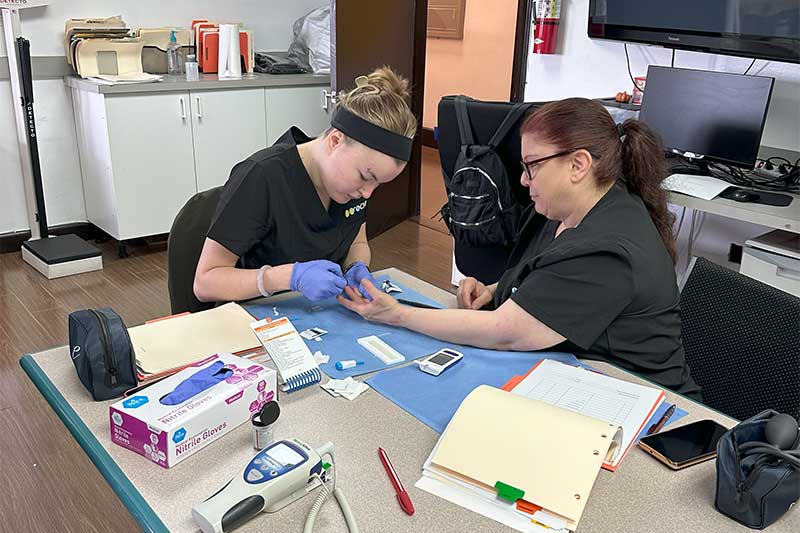Are you considering a career in nursing but unsure where to start? Whether you’re a student or looking to switch careers, understanding the different levels of nursing can be daunting. But don’t worry! We’ve got you covered.
In this blog post, we’ll explore the various levels of nursing, from entry-level positions to advanced practice roles. By the end, you’ll have a clear picture of the opportunities available and the path that best fits your career goals.
Understanding the Nursing Professions
Are you considering a healthcare career? Our comprehensive fact sheet covers all nursing professions, including pathways, the role of continuing education, and potential specialties.
Certified Nursing Assistant (CNA)
A Certified Nursing Assistant (CNA) is often the first step in the nursing career ladder. CNAs provide basic patient care under the supervision of licensed nurses. They help with daily activities like bathing, dressing, and eating.
CNA training typically takes a few months and involves both classroom instruction and clinical practice. After completing a state-approved program, you must pass a competency exam to become certified.
CNAs are vital in patient care, offering hands-on assistance and emotional support. It’s an excellent entry point for those new to the healthcare field.
Licensed Practical Nurse (LPN)
The next level up is the Licensed Practical Nurse (LPN), also known as a Licensed Vocational Nurse (LVN) in some states. LPNs perform more advanced tasks than CNAs, such as administering medications and monitoring vital signs.
To become an LPN, you must complete a practical nursing program, which usually takes about a year. Afterward, you must pass the NCLEX-PN exam to obtain your license.
LPNs work in various settings, including hospitals, long-term care facilities, and home healthcare. This role offers more responsibility and better pay than a CNA position, making it a popular choice for career changers.
Registered Nurse (RN)
Registered Nurses (RNs) are the backbone of the healthcare system. They provide comprehensive patient care, educate patients and their families, and coordinate with other healthcare professionals.
There are multiple pathways to becoming an RN. You can earn an Associate Degree in Nursing (ADN), which takes about two years, or a Bachelor of Science in Nursing (BSN), which typically requires four years. Both degrees prepare you for the NCLEX-RN exam, a prerequisite for licensure.
RNs have a broad scope of practice and can specialize in areas like pediatrics, oncology, or emergency care. With a higher level of education and responsibility, RNs enjoy more career opportunities and higher salaries.
Advanced Practice Registered Nurse (APRN)
For those seeking advanced roles, becoming an Advanced Practice Registered Nurse (APRN) is a great option. APRNs include Nurse Practitioners (NPs), Clinical Nurse Specialists (CNSs), Nurse Anesthetists (CRNAs), and Nurse Midwives (CNMs).
To become an APRN, you must earn a Master of Science in Nursing (MSN) or a Doctor of Nursing Practice (DNP). These programs usually take two to four years to complete and include specialized training in your chosen field.
APRNs have a high degree of autonomy and often serve as primary care providers. They can diagnose and treat illnesses, prescribe medications, and perform procedures. This level of nursing offers the greatest potential for career advancement and earning power.
Choosing Your Path
Assessing Your Goals
Before embarking on your nursing journey, take some time to assess your career goals. Consider factors like the level of responsibility you want, the type of work environment you prefer, and your long-term aspirations.
If you’re new to healthcare, starting as a CNA or LPN can provide valuable experience and help you decide if nursing is right for you. For those already committed to a nursing career, pursuing an RN or APRN role may be the best path.
Education and Training
Your chosen nursing level will determine the education and training required. Research accredited programs in your area and consider factors like cost, duration, and curriculum.
Many nursing programs offer flexible schedules, including evening and weekend classes, to accommodate working students. Some schools also offer online courses, making it easier to balance your studies with other responsibilities.
Financial Considerations
Nursing education can be expensive, but there are many financial aid options available. Look for scholarships, grants, and loan forgiveness programs for nursing students.
Many healthcare employers offer tuition assistance or reimbursement programs for their employees. Additionally, some states have incentive programs for nurses willing to work in underserved areas.
The Role of Continuing Education
Lifelong Learning
Nursing is a dynamic field that requires ongoing education to stay up-to-date with the latest medical advancements and best practices. Many states require nurses to complete continuing education (CE) credits for license renewal.
CE opportunities include workshops, conferences, online courses, and certifications. Staying current in your field not only enhances your skills but also improves patient care and job satisfaction.
Advanced Certifications
Earning advanced certifications in specialized areas can boost your career and increase your earning potential. Certifications validate your expertise and commitment to your profession.
Popular certifications for RNs and APRNs include Critical Care Nurse (CCRN), Certified Pediatric Nurse (CPN), and Family Nurse Practitioner (FNP). These credentials can open doors to new job opportunities and leadership roles.
Networking and Professional Organizations
Joining professional nursing organizations can provide valuable networking opportunities, resources, and support. Organizations like the American Nurses Association (ANA) and specialty groups like the Emergency Nurses Association (ENA) offer memberships that include access to journals, webinars, and conferences.
Networking with other nurses can help you stay informed about industry trends, job openings, and educational opportunities. It also provides a sense of community and support throughout your career.
Gaining Experience
Clinical Rotations
During your nursing education, you’ll participate in clinical rotations that provide hands-on experience in various healthcare settings. These rotations are essential for developing practical skills and gaining exposure to different specialties.
Take advantage of these opportunities to explore areas of interest and build your resume. Networking with healthcare professionals during rotations can also lead to job offers upon graduation.
Volunteering
Volunteering in healthcare settings can provide additional experience and demonstrate your commitment to the field. Look for volunteer opportunities at hospitals, clinics, and community health organizations.
Volunteering can help you develop essential skills, build your network, and enhance your resume. It’s also a rewarding way to give back to your community.
Internships and Externships
Some nursing programs offer internships or externships that provide paid, hands-on experience in a clinical setting. These opportunities can help you transition from student to professional nurse and often lead to job offers.
Research available programs and apply early, as these positions can be competitive. An internship or externship can provide valuable experience and make you a more attractive candidate to potential employers.
Building Your Career
Job Search Strategies
Once you’ve completed your education and gained experience, it’s time to start your job search. Use job boards, hospital websites, and professional organizations to find job openings.
Networking is also crucial in the job search process. Attend industry events, join professional organizations, and connect with fellow nurses and healthcare professionals.
Crafting a Compelling Resume
Your resume is your first impression on potential employers. Highlight your education, experience, certifications, and any special skills or accomplishments.
Tailor your resume to each job application, emphasizing the qualifications that align with the position. Include a well-written cover letter that showcases your passion for nursing and your commitment to patient care.
Interview Preparation
Prepare for interviews by researching the hiring organization and practicing common interview questions. Be ready to discuss your experience, skills, and how you handle challenging situations.
Highlight your strengths and demonstrate your enthusiasm for the role. Remember to ask questions about the job, team, and work environment to ensure it’s a good fit for you.
Conclusion
Navigating the nursing profession can be challenging, but understanding the different levels of nursing and the paths to each can help you make informed decisions. From CNAs providing essential daily care to APRNs leading healthcare teams, there’s a nursing role for everyone.
Take the time to assess your goals, research educational programs, and gain experience through clinical rotations, volunteering, and internships. Continuing education and networking will further enhance your career and help you stay current in this dynamic field.
Ready to take the next step in your nursing career? Explore our [resource page] for additional information and opportunities to connect with other nursing professionals. Your journey in nursing is just beginning, and the possibilities are endless.




